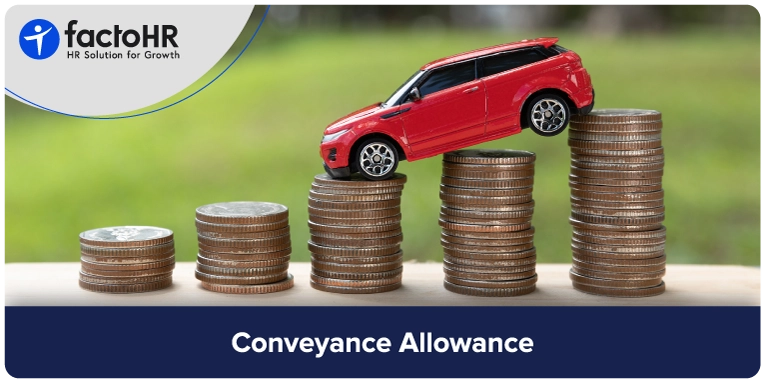What is Conveyance Allowance: Meaning, Exemption & How to Calculate

Table of Contents
Conveyance allowance helps employees cover daily commuting expenses and offers tax benefits under Indian tax laws. A recent report found that Indian office workers spend, on average, 59 minutes commuting one-way (roughly 20 km).
Employees can claim tax exemption of up to ₹1,600 per month (₹19,200 per year). This allowance reduces taxable income and lowers monthly travel costs. Employers usually add a conveyance allowance as a fixed part of the salary structure. It supports employees who travel to work and helps them manage their expenses efficiently.
Key Takeaways:
- A conveyance allowance helps employees cover daily commuting expenses between home and the office.
- Tax exemption limit is ₹1,600 per month or ₹19,200 per year under Section 10(14) of the Income Tax Act.
- Amounts exceeding ₹1,600 per month are taxable as part of the employee’s salary.
- No receipts are required to claim the exemption, but keeping basic records is advisable.
- Eligibility excludes self-employed individuals and those using company-provided transport or fuel reimbursement.
- Special higher exemptions apply to employees with disabilities and certain government officials.
- Conveyance allowance is typically part of the salary structure and reflected in Form 16 and monthly TDS.
What is a Conveyance Allowance?
Conveyance allowance is a fixed or variable monthly amount that employers pay to help employees cover their daily commute between home and the workplace. It also offers tax benefits under Section 10(14) of the Indian Income Tax Act, with an exemption of up to ₹1,600 per month. It is one of the commonly offered non-taxable allowances for salaried employees.
Employees generally receive a conveyance allowance when their role involves regular office travel.

How to Calculate Conveyance Allowance?
Calculating this allowance is straightforward when you know the exemption limit. Under Indian tax rules, the maximum exemption is ₹1,600 per month or ₹19,200 per year. The exempt amount is the least of the following:
- Allowance paid by the employer
- Actual commuting expenses (if considered)
- ₹1,600 per month
The applicable calculation formula is as follows:
Taxable Conveyance Allowance = Total Allowance – ₹1,600 (monthly exemption)
Example Calculation
If your employer pays ₹6,000 as travel allowance per month:
- Total allowance: ₹6,000
- Exempt amount: ₹1,600
- Taxable amount: ₹4,400 per month
Yearly Impact
- Yearly allowance received: ₹72,000
- Yearly exemption: ₹19,200
- Yearly taxable allowance: ₹52,800
This taxable amount affects how you calculate income tax during filing. Receipts are not mandatory for availing this exemption. However, keeping basic travel records can be helpful for clarity and organization.
If your salary includes other allowances that affect your tax slab or if you have a complex tax structure, it is advisable to consult a tax professional. Understanding this figure also requires knowing the difference between CTC vs Gross vs Net Salary.
Conveyance Allowance Exemption Limit for AY 2025-26
Under Section 10(14) of the Indian Income Tax Act, most salaried employees can claim this type of allowance exemption of ₹1,600 per month or ₹19,200 per year. This exemption applies only when the employee receives a travel allowance as part of the salary and is not using company-provided transport facilities.
Since FY 2018–19, this exemption has been merged into the ₹50,000 standard deduction. This means salaried employees now receive the tax benefit automatically through the standard deduction. However, the original conveyance allowance structure still applies in cases where employers continue to list this allowance as a separate component in the salary structure.
Employees are advised to maintain supporting evidence when claiming actual commuting expenses, particularly if the employer requests documentation.

Special and Additional Exemptions
Some employees qualify for higher transport-related exemptions under specific rules. These exemptions fall under Section 10(14) and apply only in special situations:
- Employees with disabilities: A higher exemption is allowed for employees who are blind or have an orthopedic disability. The transport allowance for such cases is fully exempt up to the limit defined by law.
- Government officials and UPSC members: Travel allowances for duties performed by certain government officers and UPSC members are exempt from taxation.
- Diplomats and foreign nationals: Transport allowances granted to diplomats and foreign citizens working in India are entirely tax-free.
- Employees working in remote areas: Additional transport-related benefits may be exempt when commuting involves high costs or difficult travel conditions.
- Employees working in hazardous or high-risk locations: Workers posted in dangerous zones may be eligible for extra transportation compensation that qualifies for exemption.
These exemptions are applied only when supported by proper records or official documentation. So, when does it usually apply?
- Employees who travel daily to their office or work location.
- Staff who use public transport or personal vehicles for regular commuting.
- Workers whose salary structure includes a separate conveyance component.
- Daily travel costs between home and office.
- Fuel or public transport charges for routine commuting.
- Minor travel-related expenses linked to everyday office travel.
Benefits of Conveyance Allowance
- Save on commuting costs: Helps cover fuel, maintenance, and public transport fares for daily office travel.
- Enjoy tax exemptions: Reduces taxable income by up to ₹1,600 per month under Indian tax rules as per the TATAAIG survey and data.
- Flexible commute options: Provide employees with the freedom to choose their preferred mode of transportation, such as bus, train, bike, or car.
- Improve work-life balance: Reduces commute stress and time pressure, which supports better productivity and personal well-being. Organizations may also support travel through employee wellness programs.
Recent data (January – December 2024) from the MoSPI Time Use Survey shows that Indian male workers spend 77 minutes per day commuting for employment-related activities, and female workers spend 67 minutes per day. This makes conveyance benefits more important for modern workplaces.
Employers can further encourage sustainable commuting by offering subsidies for public transport or cycling schemes.
Eligibility Criteria
Employees can receive a conveyance allowance when they meet specific conditions related to daily travel and salary structure. It generally applies in the following cases:
- The employee commutes regularly between home and office, typically over medium or long distances.
- The employee uses a personal vehicle or public transport for daily travel.
- The allowance is included in the salary structure or mentioned in the employment contract.
- Self-employed individuals are not eligible for this type of allowance.
- Employees who use company-provided cars or receive fuel reimbursement may not be eligible for this allowance.
- If the employer offers a transportation facility or office shuttle, the travel allowance may not be applicable.

How to Claim Conveyance Allowance?
Claiming conveyance allowance is straightforward, as the process is primarily managed through your salary structure. The amount is displayed on your payslip and in Form 16 under the salary details section.
The tax exemption of ₹1,600 per month is usually applied automatically by the employer while calculating your monthly TDS. You do not need to submit a separate form to claim it.
Employees should maintain basic records of commuting expenses only if they intend to claim actual travel costs in excess of the fixed allowance. This situation is uncommon, but having proof helps when employers request documentation.
If you are unsure about your eligibility or how your salary is structured, it is advisable to consult your finance team or speak to a tax advisor.
Conclusion
The conveyance allowance helps employees reduce their daily travel costs and save tax through the ₹1,600-per-month exemption. It is essential for employees to know how this allowance is shown in their salary and how the tax benefit is applied. With this understanding, they can plan their monthly budget better and avoid mistakes during tax filing.
Keeping basic travel records is helpful if the employer requests proof or if actual travel claims are required. Use factoHR’s payroll software to manage salary structures easily and stay compliant with conveyance allowance rules. You can also check related tools and calculators for quick guidance.
FAQs
Is Conveyance Allowance Taxable?
It is partly taxable. Employees get a tax exemption of up to ₹1,600 per month, and the remaining amount becomes taxable as part of their salary. If an employee receives more than the limit, only the extra portion is added to taxable income.
How to Calculate the Conveyance Allowance in the Salary?
You can calculate it by subtracting the exemption from the total amount paid. The exemption is ₹1,600 per month.
Taxable Allowance = Total Allowance – ₹1,600.
This helps you know how much of the allowance is added to your taxable income.
What is a Conveyance Allowance in Salary?
It is a fixed monthly amount paid by employers to help employees cover daily travel between home and office. It also offers a small tax benefit. Many companies include it in their salary structure to support employees who incur regular commuting expenses.
How Much Conveyance Allowance is Exempt?
Employees can claim a tax exemption of up to ₹1,600 per month or ₹19,200 per year. This is the maximum limit allowed under Indian tax rules. Any amount above this limit becomes taxable and is added to the employee’s salary income.
Conveyance Allowance Exemption is under which Section?
The exemption falls under Section 10(14) of the Indian Income Tax Act. This section covers various types of allowances designed to support employees in covering specific expenses, including daily travel between home and the workplace.
Grow your business with factoHR today
Focus on the significant decision-making tasks, transfer all your common repetitive HR tasks to factoHR and see the things falling into their place.

© 2026 Copyright factoHR


